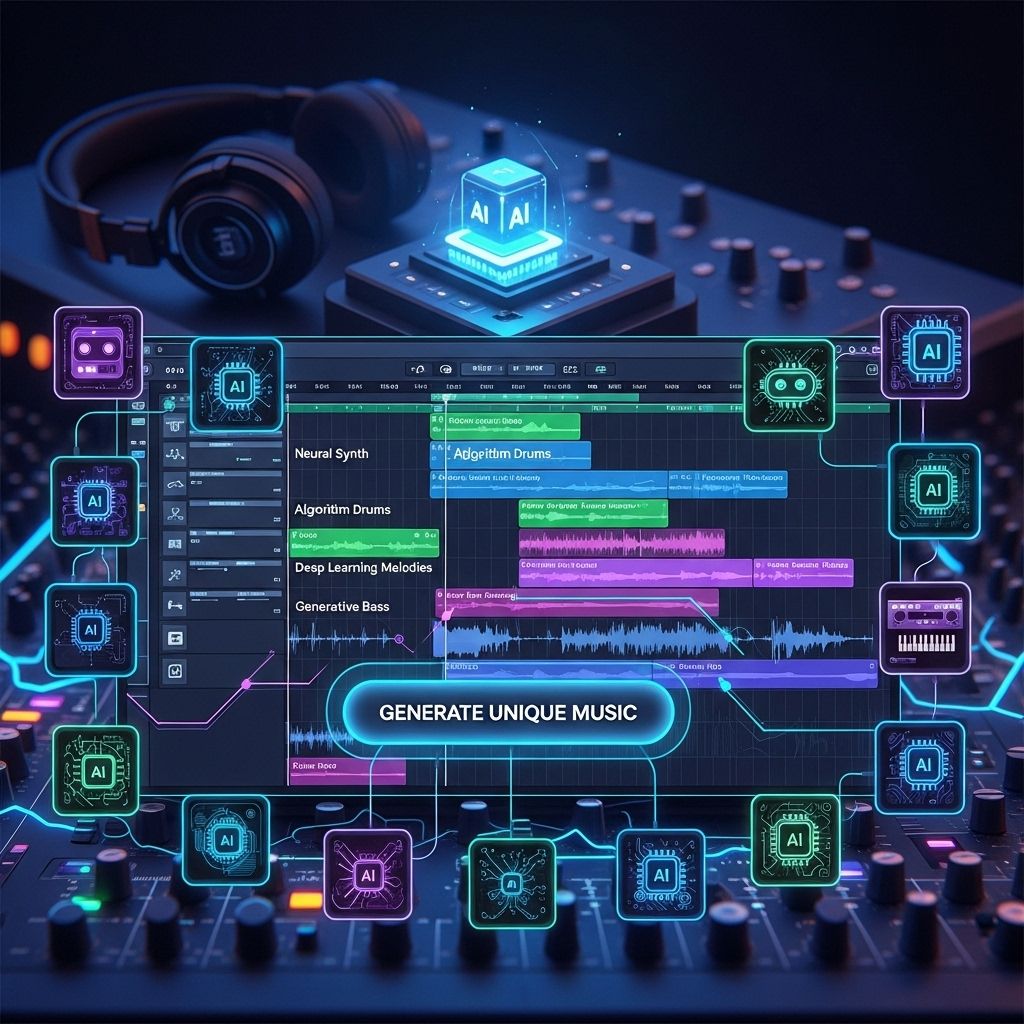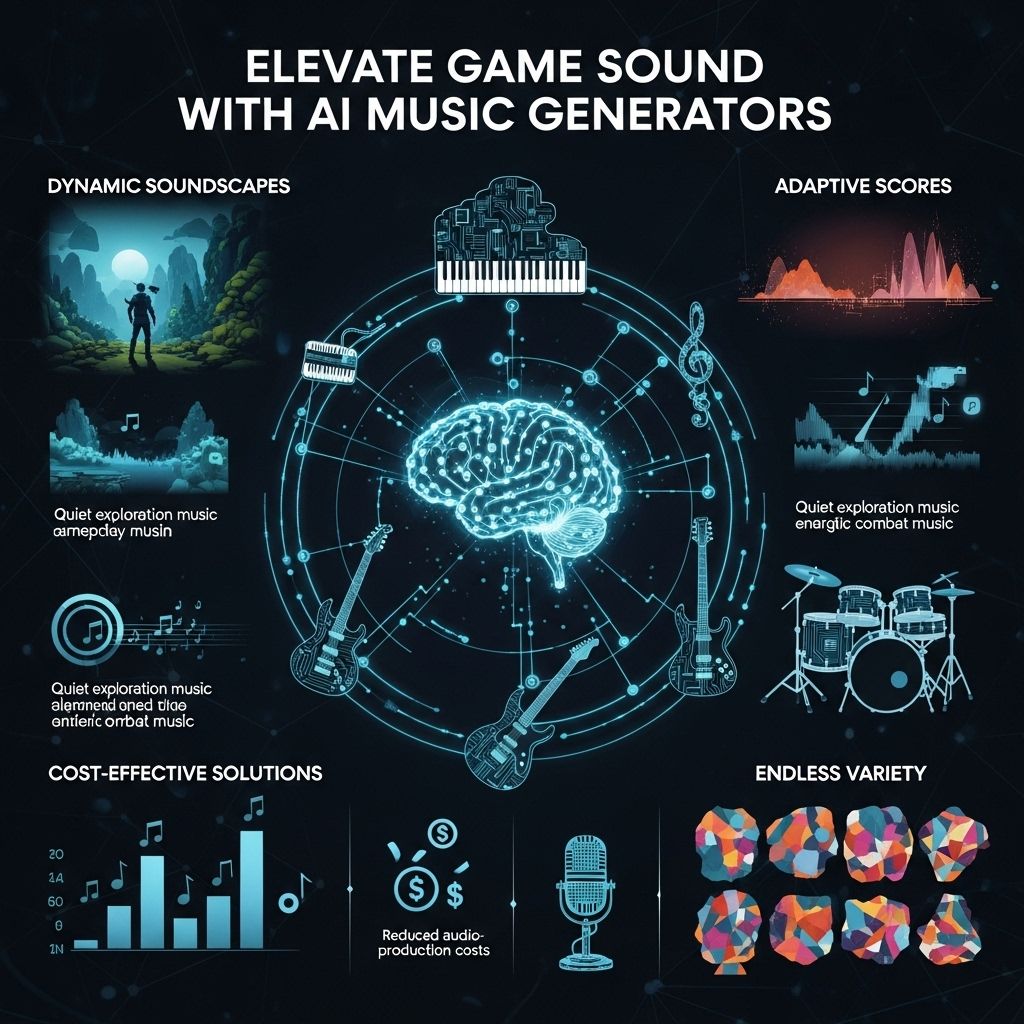Create Unique Game Music with AI Generators
Discover how to create unique game music using AI generators and elevate your gaming experience with custom soundtracks.

In the ever-evolving landscape of video game development, one of the most crucial yet often overlooked elements is the soundtrack. A powerful game score can elevate the gaming experience, immerse players in the storyline, and reinforce the emotional weight of gameplay. With advancements in artificial intelligence, developers and musicians alike are now leveraging AI generators to create unique and compelling game music. This article explores the capabilities of AI in music generation, its benefits, and how to effectively incorporate it into game design.
Table of Contents
The Rise of AI in Music Production
Artificial intelligence has made significant strides in various fields, and music production is no exception. Traditional methods of composing music can be time-consuming and require extensive expertise. AI generators offer an innovative solution that streamlines this process. Below, we explore the key advancements in AI music generation:
- Algorithmic Composition: Using algorithms, AI can analyze existing musical compositions to create new pieces that follow similar patterns and styles.
- Machine Learning: AI systems can learn from vast libraries of music to produce original scores that mimic the characteristics of specific genres or artists.
- Real-Time Generation: Some AI tools can generate music in real-time, allowing developers to create dynamic soundtracks that adapt to gameplay.
Advantages of Using AI for Game Music
Integrating AI-generated music into game design offers several advantages:
1. Cost-Effectiveness
Hiring a composer can be expensive, especially for indie developers with limited budgets. AI music generators provide an affordable alternative, allowing creators to access high-quality music without breaking the bank.
2. Speed and Efficiency
With AI, the time required to develop a unique soundtrack is significantly reduced. Developers can generate multiple tracks in a fraction of the time it would take a human composer, enabling quicker project turnaround.
3. Customization
AI generators often allow for a high degree of customization. Developers can specify mood, genre, tempo, and instrumentation, producing tailored soundtracks that fit the game’s theme perfectly.
4. Unique Soundscapes
AI can blend styles and genres in ways that human composers might not consider, resulting in fresh, innovative soundscapes that enhance gameplay and storytelling.
Popular AI Music Generators
Several AI music generators have gained popularity among game developers:
| Tool | Description | Best For |
|---|---|---|
| AIVA | AIVA (Artificial Intelligence Virtual Artist) specializes in composing orchestral music and can be tailored for various emotional contexts. | Emotional storytelling |
| Amper Music | A cloud-based AI music composition tool that allows users to create custom tracks easily. | Quick soundtracks |
| Soundraw | Generates music based on user-defined parameters, offering a library of endless unique tracks. | Customization and flexibility |
| OpenAI’s MuseNet | A deep learning model that can generate compositions in various styles and combine different genres. | Innovative genre-blending |
How to Effectively Incorporate AI-Generated Music into Games
While AI-generated music offers many benefits, it’s important to approach its incorporation thoughtfully to enhance the overall game experience. Here are some best practices:
1. Understand Your Game’s Vision
Before generating music, clearly define the game’s narrative, themes, and emotional tone. This understanding will guide the AI in producing appropriate soundtracks.
2. Use AI as a Tool, Not a Replacement
Consider AI-generated music as a collaborative tool alongside human composers. Blending AI-generated tracks with human creativity can yield richer results.
3. Experiment with Different Styles
Don’t hesitate to explore various genres and styles. AI tools can produce a wide range of musical forms, allowing for experimentation that could lead to unexpected but delightful results.
4. Test with Your Audience
Gather feedback from playtesters regarding the music. Understanding how the soundtrack affects player experience can lead to valuable adjustments.
Challenges and Considerations
While the future of AI in music generation looks promising, there are challenges developers should consider:
- Lack of Emotional Depth: AI may struggle to convey complex emotions in the same way a human composer can.
- Originality Concerns: There’s the potential risk of AI-generated music sounding similar to existing works, raising questions of originality.
- Licensing Issues: Ensure that the generated music meets licensing requirements to avoid legal complications.
The Future of AI-Generated Game Music
As technology continues to advance, the role of AI in music production is likely to grow. Future developments may lead to even more sophisticated tools that can understand context and emotion, creating soundtracks that resonate deeply with players. For example, advancements in emotion AI could allow music to adapt based on player decisions or in-game events, tailoring the experience in real-time.
Conclusion
AI music generators are revolutionizing the way game music is created, offering developers a myriad of options to enhance their projects. By understanding the tools available and the best practices for implementation, game developers can create unique, engaging soundtracks that elevate the player’s experience. As we look forward to the future of gaming, it is clear that AI will continue to play a pivotal role in shaping the soundscapes of tomorrow’s games.
FAQ
What are AI music generators?
AI music generators are software tools that use artificial intelligence algorithms to create original music compositions, allowing users to generate unique soundtracks for various projects.
How can I use AI to create game music?
You can use AI music generators to compose music tailored for your game by selecting genres, moods, and styles that fit the theme of your game, then letting the AI create music based on your preferences.
Are the music compositions generated by AI copyright-free?
Most AI music generators provide users with copyright-free music, but it’s essential to check the specific licensing agreements of the tool you choose to ensure you can use the music in your projects without restrictions.
What are the benefits of using AI for game music creation?
Using AI for game music creation can save time and resources, allow for rapid prototyping of soundtracks, and offer innovative compositions that might not be easily created by humans.
Can I customize the music generated by AI?
Yes, many AI music generators allow users to customize elements such as tempo, instrumentation, and mood, enabling you to tailor the music to fit your specific game requirements.
Which AI music generation tools are recommended for game developers?
Popular AI music generation tools for game developers include Amper Music, AIVA, and OpenAI’s MuseNet, each offering unique features suited for creating game soundtracks.

